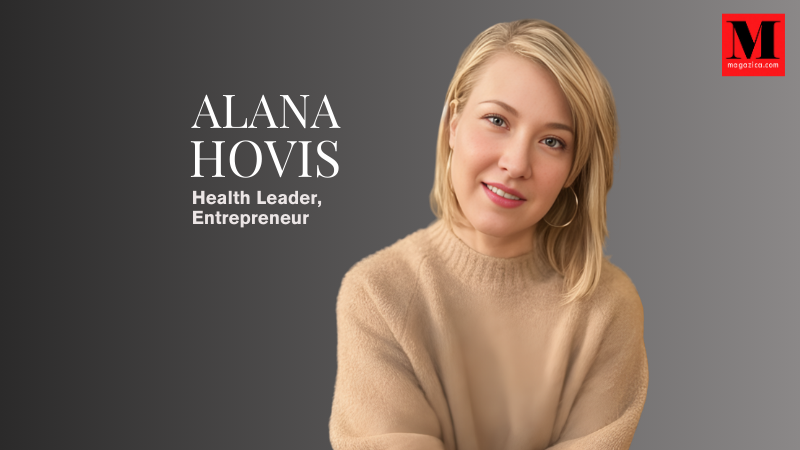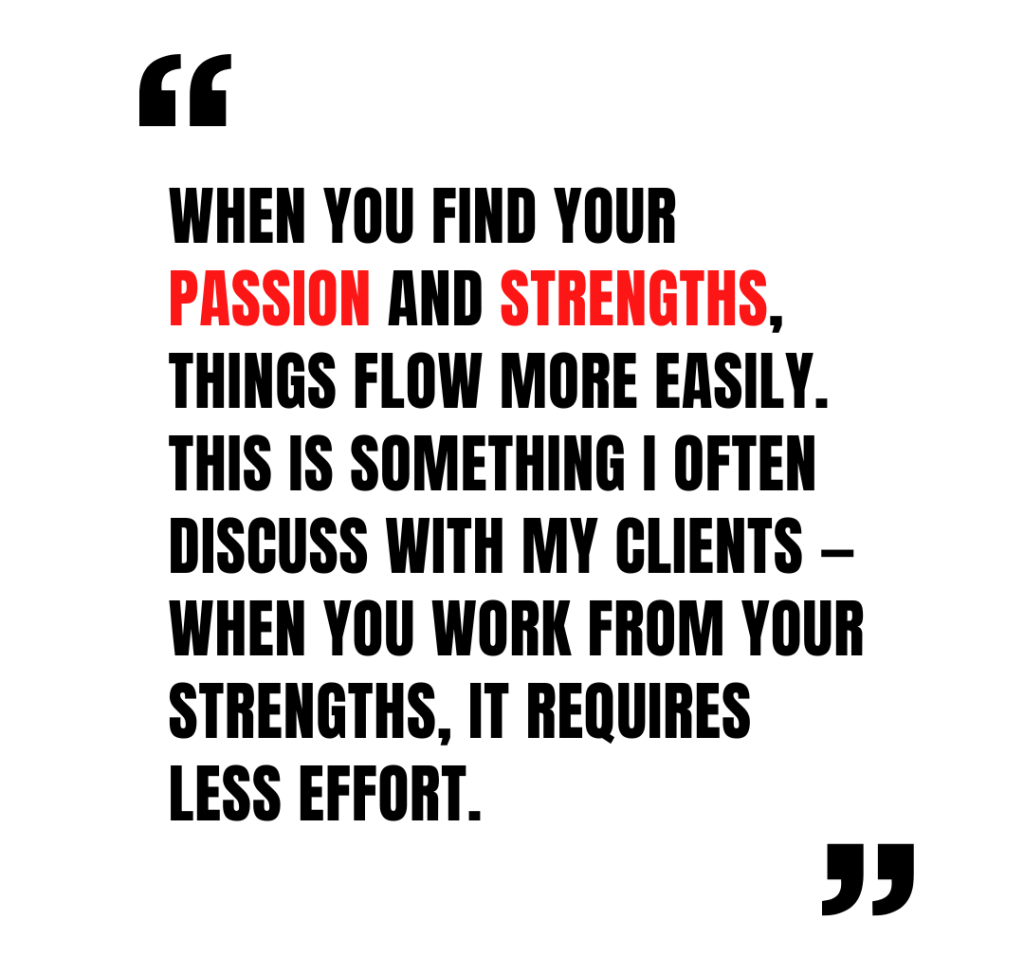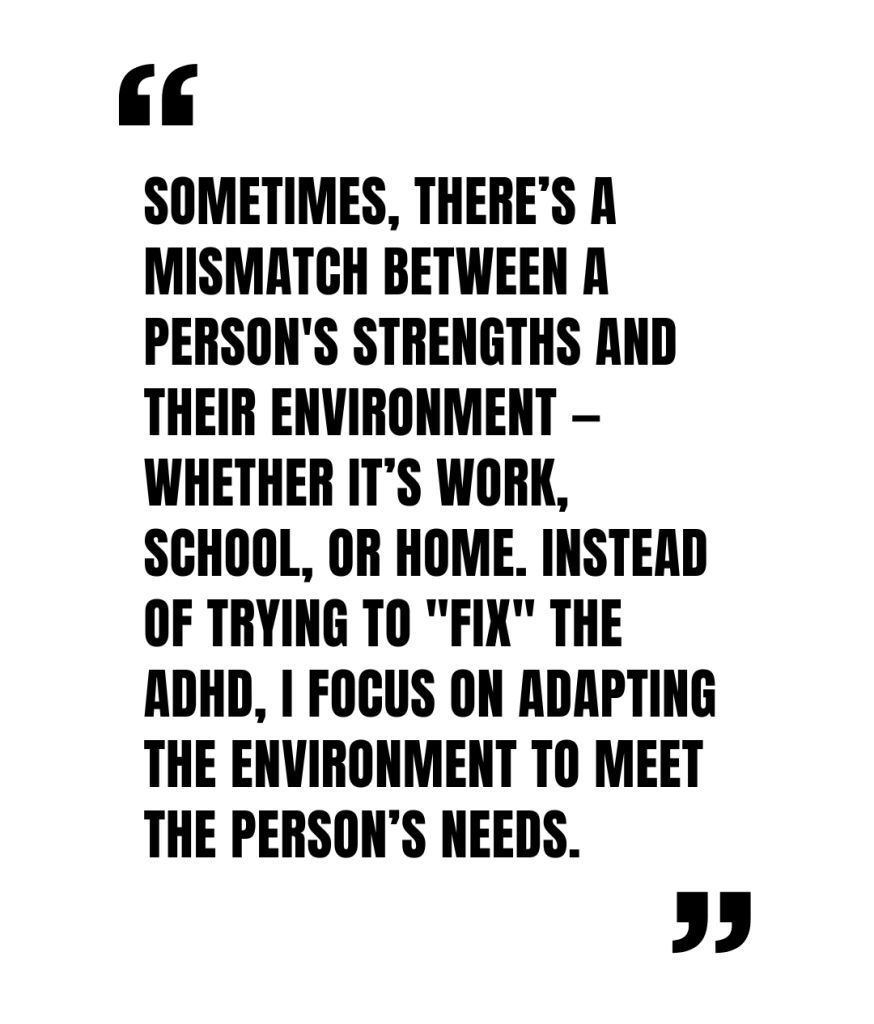Alana Hovis on Managing ADHD and Mental Well-being: In Search of Insights for Tech-Driven Solutions to Thrive in the Modern World
- Home
- Alana Hovis on Managing ADHD and Mental Well-being: In Search of Insights for Tech-Driven Solutions to Thrive in the Modern World

Alana Hovis on Managing ADHD and Mental Well-being: In Search of Insights for Tech-Driven Solutions to Thrive in the Modern World
Alana Hovis is not your typical therapist. She’s a seasoned expert, an entrepreneur, and a mother who understands ADHD from both a personal and professional perspective. In this insightful interview, she shares her unique approach to ADHD treatment, emphasising the importance of “person-environment fit”, innovative techniques like AI, and the power of self-compassion. Get ready to discover practical strategies for navigating daily challenges, building resilience, and thriving in today’s world.
Magazica: Dear readers and viewers, welcome to Magazica. Today’s guest is a highly experienced therapist and entrepreneur, Alana Hovis. Alana brings over 24 years of experience in the field of mental health and wellness. She is the owner of EEG Rehabilitation and founder of MotoPal, a health tech company that specializes in ADHD.
She also works as an occupational therapist at Island Health, Vancouver Island Health Authority. As a certified ADHD rehabilitation service provider and a member of the Canadian ADHD Resource Alliance, Alana is deeply involved in supporting individuals with ADHD. We will gain some very insightful ideas from her today.
Alana, warm welcome to Magazica.
Alana Hovis: Thank you for having me. It’s an honor.
Magazica: Thank you. We always start with a personal touch to the journey. Could you tell us about your path into mental health and what inspired you to specialize in ADHD rehabilitation?
Alana Hovis: Yes, as you mentioned, I’ve been an occupational therapist for over 20 years. I began my career in a hospital setting, working in the acute psychiatric unit and later transitioned to a community mental health team.
Through that experience, I realized I really enjoyed connecting with people, learning their unique stories, and supporting their journeys of self-discovery. While I still work in physical medicine, I love journeying alongside people and understanding their stories.
Magazica: What motivated you to start MotoPal, and how has it shaped your approach to ADHD treatment?
Alana Hovis: I come from a background with no tech experience, so this path found me. I love creating and finding solutions to problems, so it turned out to be a natural fit. My son was diagnosed with ADHD, which prompted me to learn as much as possible about the condition.
I wanted to find resources and tools to help him, and that inspired me to help others on their ADHD wellness journey.
Magazica: Yes, truth becomes personal through our own experiences.
Alana Hovis: Exactly. Passion fuels creativity and innovation. When you find your passion and strengths, things flow more easily. This is something I often discuss with my clients — when you work from your strengths, it requires less effort.
Magazica: You mentioned two key words: passion and innovation. When you are passionate, innovation flows naturally.
Alana Hovis: Absolutely. It takes less effort, and everything aligns with what makes you tick.
Magazica: Can you share some innovative techniques or therapies you use at MotoPal or EEG Rehabilitation that have shown significant results for individuals with ADHD?
Alana Hovis: The field of ADHD research is ongoing, which is exciting. I’m particularly curious about the potential of AI to assist with executive function challenges. AI can help reduce cognitive load, making daily tasks easier to manage.
For example, clients use AI to write difficult emails or break large projects into manageable steps. This helps bridge the motivational gap and reduces feelings of overwhelm. I’ve seen this be quite effective in practice, and I’m eager to see how this evolves.
Magazica: We are certainly living in a rapidly transforming world.
Alana Hovis: Yes, exactly.
Magazica: I often notice that starting any project is challenging. Sometimes, YouTube videos romanticize entrepreneurship, but in reality, it’s all blood and sweat.
Alana Hovis: Absolutely. There are many ups and downs. You have to remember your “why” — your reason for doing it — and stay focused on the end goal. Embrace the journey, including the messy parts, because that’s often where growth and beautiful moments happen.
Magazica: Order out of chaos. What were some of the biggest challenges you faced, and how did you overcome them?
Alana Hovis: In mental health, progress isn’t always linear. Unlike physical injuries that heal in weeks, mental health takes time. I encourage clients to be patient with themselves, discover what works best for them, and celebrate small successes along the way. Self-compassion is key.
Magazica: I can personally relate to that. As we discussed before the interview, it’s a long-term game, not a 90-minute match. A strong “why” and self-compassion are essential for this journey.
Alana Hovis: Exactly. It’s a journey with many paths. We don’t always know what’s around the corner, and while some surprises are wonderful, others are difficult.
Magazica: Both positive and negative moments shape the journey.
Alana Hovis: Yes, and having a community to support you is essential. Connection with others helps you navigate the challenges.

Magazica: Fantastic. Working in mental health requires a holistic viewpoint. How do you incorporate holistic health practices into your treatment plans, and what benefits have you observed?
Alana Hovis: Occupational therapy is holistic by nature. We place the person at the center and consider influencing factors like environment. For individuals with ADHD, the concept of “person-environment fit” is crucial.
Sometimes, there’s a mismatch between a person’s strengths and their environment — whether it’s work, school, or home. Instead of trying to “fix” the ADHD, I focus on adapting the environment to meet the person’s needs.
When people work from their strengths, it reduces cognitive effort, lowers stress, and improves confidence and satisfaction in daily activities.
Magazica: It’s always the other way around. We are not trying to fit the person to the system. Rather, we tweak the environment so that it creates a growth climate for the individual, isn’t it?
Alana Hovis: Exactly. Doesn’t that feel a lot less stressful and more freeing? It acknowledges that we all operate differently. So how can we all fit into the same environment?
Magazica: That’s a kind of cookie-cutter approach. Even when we were growing up, remember our school days? We were all together, but we grew at different speeds.
Alana Hovis: Yeah.
Magazica: And later on, we catch up—not even necessarily with each other, but with life. Our growth history is very individual, isn’t it?
Alana Hovis: Absolutely. It’s part of a growth mindset—approaching things from a strength-based perspective. Everyone goes at their own pace and has different strengths. Acknowledging that can help us shift away from needing everyone to be the same, which isn’t good for society as a whole.
Magazica: Yes, when we talk about making the environment work for the individual rather than the other way around, a big part of that is the family. It’s a long-term process. What advice would you give to families with children or adults diagnosed with ADHD to help them navigate their daily challenges and thrive?
Alana Hovis: I think one of the most important approaches is to become a detective in your own life. I often work with clients and recommend collecting data to understand what works best for them. We do a series of experiments to see what works and what doesn’t. Are there patterns during the day where focus is better? Great! We can schedule cognitively demanding tasks during those times.
It’s about exploring your strengths and figuring out how to capitalize on them in your day-to-day life. Maybe certain tasks are better delegated to someone else who excels at them. Perhaps you need to swap tasks within the family routine so that everyone is working from their strengths. Sometimes, small changes can make a big difference in managing daily life and thriving.
There’s also a lot of research on medications for ADHD. Consulting with your practitioner or pharmacist can help with that. The CADDRA website has a good medication chart, which can be a useful resource.
And as we’ve mentioned, celebrating our differences is key. We don’t necessarily need to change each other. It’s like an engine—nothing works if we have all the same parts. For things to function, different parts need to work together.
Magazica: Yes.
Alana Hovis: When we celebrate our differences, our family systems, work systems, and school systems can operate optimally.
Magazica: So, first, you’re collecting as much data as possible to make the process humane and individualistic.
Alana Hovis: Yes.
Magazica: And you’re involving all the stakeholders in that individual’s life, whether it’s a physician, clinician, pharmacist, or family member. Holistically, you’re creating a growth-oriented safety net for the individual.
Alana Hovis: Exactly. It’s a team approach.
Magazica: Definitely, for sure. It’s fantastic that you view the whole process in such a humanistic, holistic, and personalized way.
Staying connected with families, pharmacists, and other medical experts requires staying current with developments in mental health and ADHD treatment. How do you stay up-to-date, and how has continuous learning influenced your practice?
Alana Hovis: I love to learn and am always curious about new developments. I attend workshops, conferences, webinars, and belong to various professional and advocacy associations. For example, the Canadian ADHD Resource Alliance (CADDRA), the Centre for ADHD Awareness Canada (CADDAC), the Canadian Association of Occupational Therapists, and CHADD in the United States all offer excellent resources and up-to-date research.
I also like to attend conferences outside my direct field. That exposure brings different perspectives and sometimes introduces tools and strategies I wouldn’t have thought of otherwise. For instance, I attended a Learning and the Brain conference focused on using AI in education. That provided new ways to approach situations by looking through a different lens.
Magazica: Listening to you reminds me of something a professor at the University of Toronto once said: A curious mind is an alive mind.
Alana Hovis: Absolutely.

Magazica: Your curiosity allows you to think holistically, outside the box, and seek insights from other experts. It seems like curiosity is part of your core competence.
Alana Hovis: Yes, that curiosity led me to explore technology, like developing MotoPal, and how it can support new drivers with ADHD. Delving into that sector helped develop tools to assist new drivers, improving safety, confidence, and peace of mind for their parents.
Magazica: Any success story from your practice that stands out?
Alana Hovis: One that stands out is helping an adult recently diagnosed with ADHD. Through our work, they realized they had spent years feeling like a square peg trying to fit into round holes. They had tried to adapt to various environments that weren’t suited to their strengths.
It was incredibly rewarding to see them discover their authentic self and experience the freedom that comes from embracing who they are. Instead of fighting their natural way of operating, they learned to work with it. That realization is powerful and life-changing.
Magazica: These moments of self-discovery are truly empowering.
Alana Hovis: Yes, it’s enriching for me as a clinician and empowering for the individual.
Magazica: That’s the impact you’re making. Those moments make your profession more passionate.
Alana Hovis: Yeah. And it’s having that human connection. I think that’s what I find rewarding, too. Sure, there are tools, strategies, and prescriptions that we know can work. But when it comes down to it, being able to connect with someone along their journey is just so great.
Magazica: Specifically, after COVID, life has become more fast-paced and challenging. What strategies do you recommend for building resilience and maintaining mental well-being in today’s world?
Alana Hovis: It’s definitely something that’s needed. I think finding what is restorative for you—what fills your tank and what empties it—is really important. That can help you decide to do more of what fills your tank and be mindful of what drains you. It’s good to have those things sprinkled throughout your day rather than letting the draining activities dominate it.
Magazica: Can you expand on the idea of “emptying the tank”? Is it related to a to-do list or emotions?
Alana Hovis: It could be anything—activities or tasks that make you feel like you’re spinning your wheels, draining your emotional well-being, physical energy, or mental state. It really can encompass anything.
Magazica: Okay.
Alana Hovis: Finding those moments to do things that fill your tank is crucial. I recently came across the idea that even the concept of “nothingness” can be an antidote to overwhelm.
Magazica: Oh, that’s powerful.
Alana Hovis: Nothingness can calm our nervous system. Sometimes, less really is more.
Magazica: That reminds me of a saying we had in the newsroom when I worked as a journalist: “No news is good news.”
Alana Hovis: Yeah, exactly.
Magazica: That implies society is in order.
Alana Hovis: Right. Again, it comes back to figuring out what works for you. For people with ADHD, sometimes doing a particular activity can be restorative. Nothingness might not work for everyone. It’s about understanding how you operate and becoming a detective in your own life. Small changes over time can have a big impact. This aligns with the work of B.J. Fogg on Tiny Habits or James Clear’s Atomic Habits.
Magazica: Yes.
Alana Hovis: Switching the structure of your day, doing things at different times, or changing tasks to align with when you’re most efficient can save energy. Maintaining well-being doesn’t always mean doing more. Some people think they need to add yoga, Pilates, or specific practices. Sometimes, just switching when you do things can make a difference.
Magazica: Fantastic.
Alana Hovis: Less is sometimes more. We don’t necessarily need to add more to our day—that takes effort, too.
Magazica: That reminds me of an Eastern philosophy: “Doing nothing is the greatest doing.”
Alana Hovis: Yes, exactly.
Magazica: Just sit. Give yourself time to relax.
Alana Hovis: We often feel like we need permission to do that. But now, research may support that it can be quite helpful.
Magazica: One of my family members calls it “me time.”
Alana Hovis: Yes. Find out what your “me time” is—it looks different for everyone.
Magazica: My cousin says, “This is my me time.” He’s a data analyst and is always with screens and data. He calls it his “conversation with himself.”
Alana Hovis: That’s very powerful.
Magazica: Nothingness can really be a calming antidote to overwhelm. That’s a profound statement. When you mentioned it, I was taking notes!
Alana Hovis: That’s not something I came up with. It’s rooted in the practice of Mindfulness and the work of people like Brené Brown.
Magazica: Everyone loves her. She’s fascinating.
Alana Hovis: Absolutely.
Magazica: What future trends do you foresee in ADHD treatment and mental health therapy? How do you plan to incorporate those into your practice?
Alana Hovis: I think we’re looking at more personalized, tech-driven solutions with data-driven interventions. These can help tailor treatment plans even further. I plan to incorporate these tools into my work to ensure clients benefit from innovation while still receiving human-centered care. Attachment theory shows us that connection supports emotional regulation and psychosocial functioning.
It also ties into the idea of environment-person fit—shifting how we think within workplaces, schools, and homes. Recognizing and celebrating our unique strengths can help us all thrive.
Magazica: Personalized, data-driven tools, human-centered approaches, and environment-person fit. That’s powerful. By listening to you, our readers will understand that, gradually but steadily, we’re heading in that direction.
Alana Hovis: I hope so. We have people with all sorts of differences. How can we celebrate those differences?
Magazica: Thank you very much for your powerful insights. I’m sure our readers will learn a lot from this conversation.
Alana Hovis: Thank you for having me and sparking the conversation. We can all learn from each other.
Magazica: Hopefully, this isn’t the last conversation we’ll have.
Alana Hovis: Sounds good. Thank you for your time.
Magazica: Thank you!
- Share
Alana Hovis
Alana Hovis is a seasoned therapist and the owner of EEG Rehabilitation. She has 24 years of experience working in mental health and wellness, holding certifications as an ADHD Rehabilitation Service Provider and a Work Capacity Evaluator. Alana is a member of several professional organisations, including the Canadian ADHD Resource Alliance, the Canadian Association of Occupational Therapists, and the World Federation of Occupational Therapists. She is also the founder of MotoPal, a health tech company focused on ADHD solutions.
